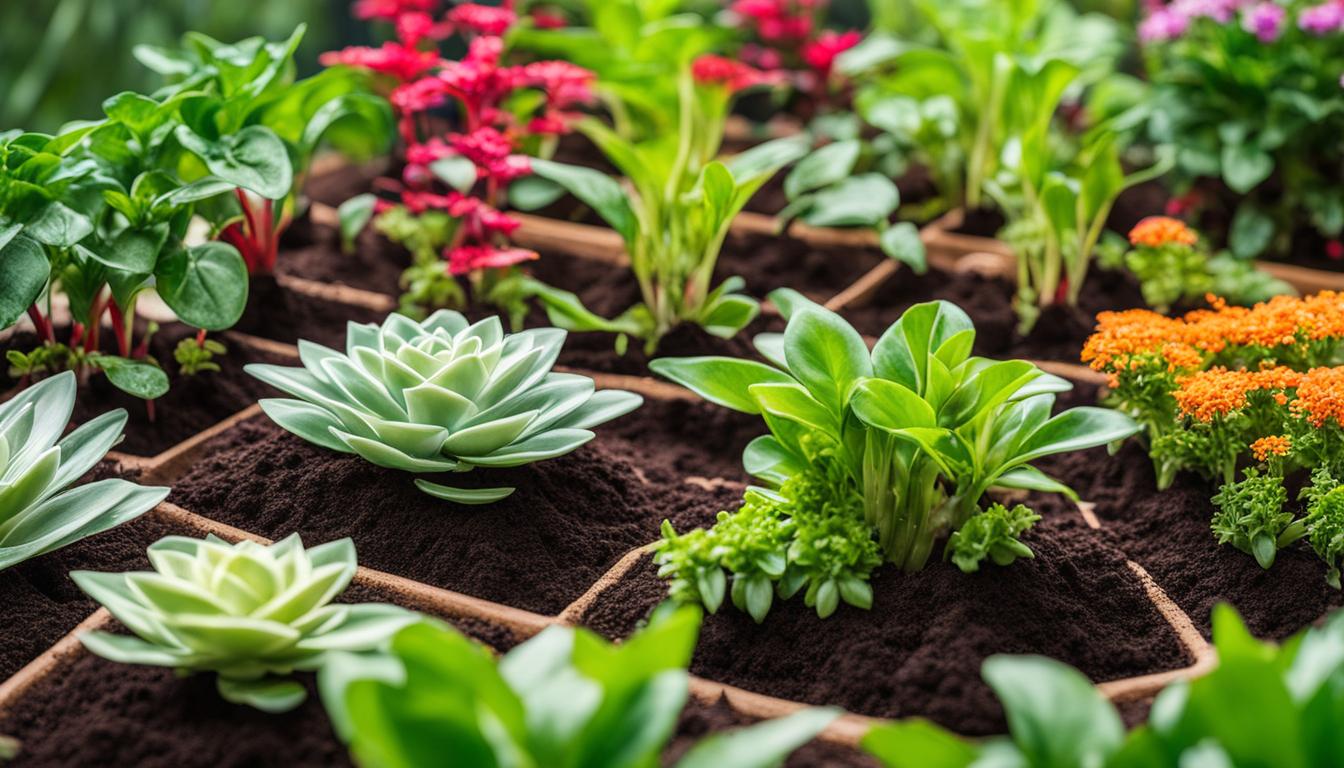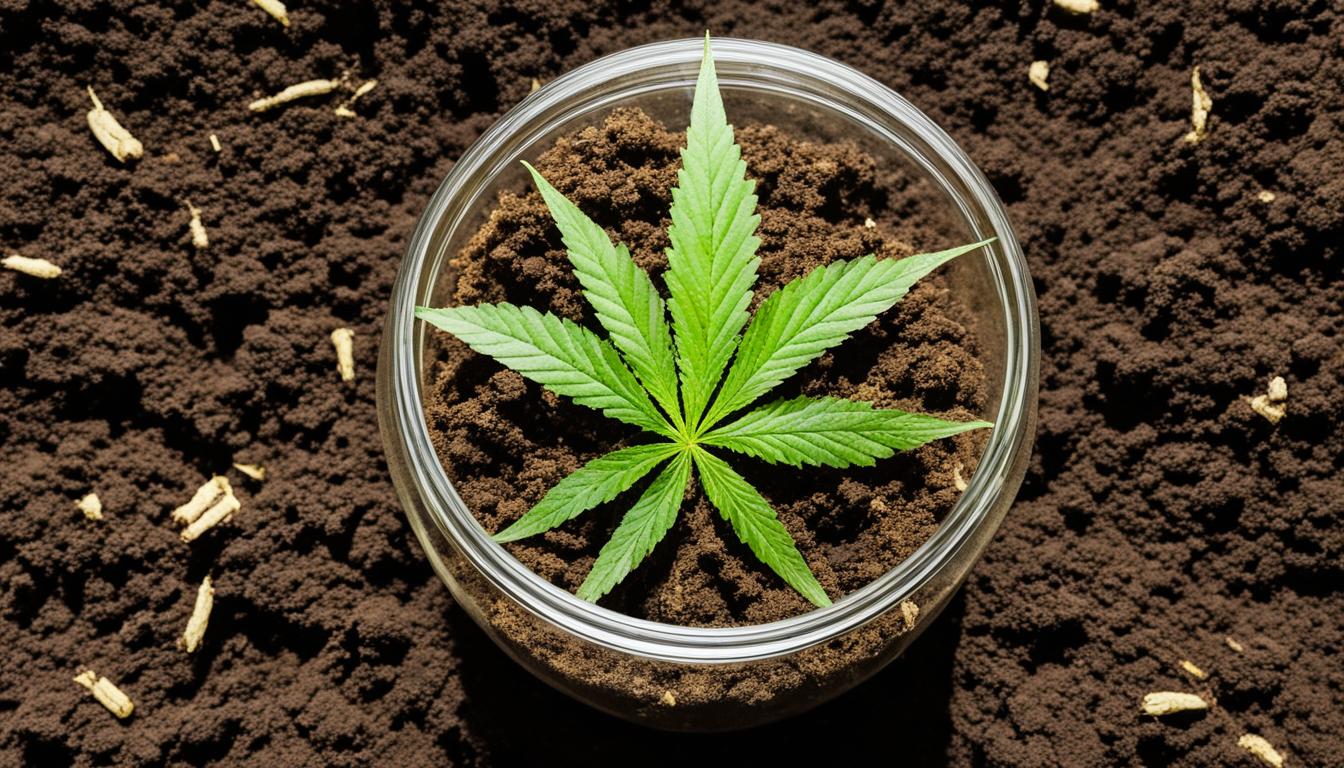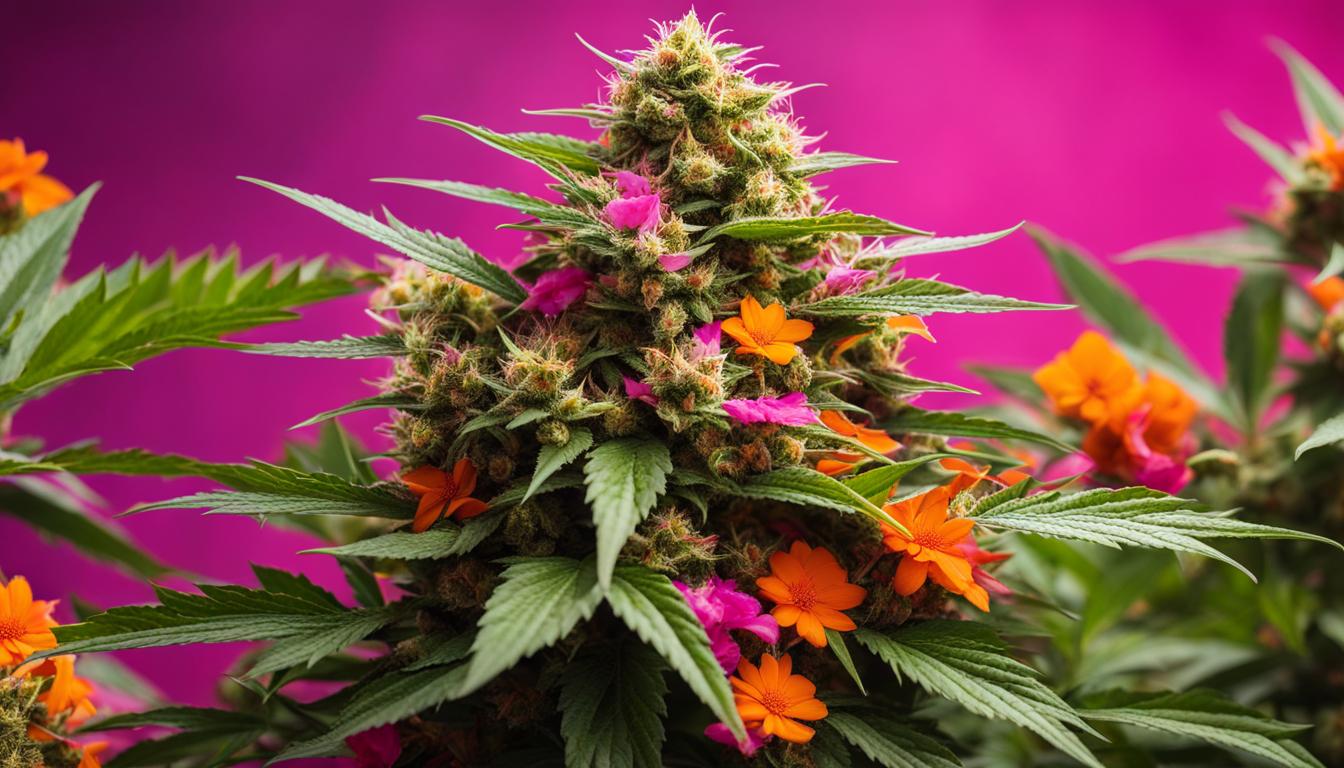Uncategorized
Best Cannabis Bloom Nutrients for Healthy Plants
Growing cannabis can be a rewarding experience, especially when you see your plants flourish and produce bountiful yields. Attaining peak health and potency is significantly influenced by furnishing them with the best nutrients available, a crucial component for nurturing their growth and overall vitality. In this article, I will discuss the best cannabis nutrients for your plants during the flowering stage.
When it comes to cannabis flowering, choosing the right nutrients is essential to support optimal growth and maximize bud production. There are specific fertilizers formulated to provide the necessary nutrients that cannabis plants need during the flowering stage. These fertilizers are designed to enhance flower development, improve bud quality, and increase overall yield. Finding the best cannabis bloom nutrients is essential for any cannabis cultivator looking to achieve exceptional results.
Key Takeaways:
- Choosing the right nutrients for cannabis flowering is crucial for healthy plant growth and abundant yields.
- Specific fertilizers formulated for the flowering stage provide the necessary nutrients for optimal flower development.
- The best cannabis bloom nutrients enhance bud quality and increase overall yield.
- Investing in high-quality cannabis flowering fertilizers ensures the best results for your plants.
- Proper nutrient management during the flowering stage is essential for achieving robust and vibrant cannabis plants.
Understanding Plant Nutrients and Fertilizers
Fertilizers are essential for providing cannabis plants with the necessary nutrients to thrive and grow vigorously. There are 17 essential elements that marijuana plants require for optimal health and development. These include macronutrients, secondary macronutrients, and micronutrients.
Macronutrients are nutrients required in larger quantities, and they play a fundamental role in plant growth. The primary macronutrients for cannabis plants are:
- Nitrogen (N): A crucial nutrient for promoting lush foliar growth and stimulating overall plant development.
- Phosphorus (P): Essential for the production of energy-rich molecules that support root development and flower formation.
- Potassium (K): Vital for regulating water movement within the plant and strengthening cell walls, resulting in healthier and sturdier plants.
Secondary macronutrients and micronutrients are required in smaller quantities but are still vital for optimal plant growth and health. Some of the secondary macronutrients for cannabis plants include calcium (Ca), magnesium (Mg), and sulfur (S). These nutrients assist in various plant functions, such as photosynthesis and enzyme activity.
Micronutrients, on the other hand, are essential elements that cannabis plants need in very small amounts. Examples of micronutrients include iron (Fe), manganese (Mn), zinc (Zn), copper (Cu), boron (B), and molybdenum (Mo). Micronutrients are involved in vital processes such as enzyme activation and cell division.
Cannabis plants require a balanced supply of these essential nutrients to perform their physiological functions effectively. A deficiency or excess of any particular nutrient can lead to growth abnormalities, reduced yields, or overall plant health decline.
Here is a table summarizing the essential nutrients for cannabis plants:
| Nutrient Type | Main Nutrients | Secondary Nutrients | Micronutrients |
|---|---|---|---|
| Macronutrients | Nitrogen (N) Phosphorus (P) Potassium (K) |
Calcium (Ca) Magnesium (Mg) Sulfur (S) |
Iron (Fe) Manganese (Mn) Zinc (Zn) Copper (Cu) Boron (B) Molybdenum (Mo) |
By understanding the different types of plant nutrients and their roles, cultivators can provide their cannabis plants with the appropriate fertilizer formulations to optimize growth and achieve healthy, vibrant, and high-yielding plants.
Organic vs Synthetic Nutrients
When it comes to providing nutrients for your cannabis plants, you have two main options: organic and synthetic. Each type has its own set of pros and cons, and understanding them can help you make an informed decision for your cultivation needs.
Organic Cannabis Fertilizers:
Organic nutrients are derived from natural sources such as compost, manure, bone meal, and seaweed. These fertilizers release nutrients slowly over time, providing a steady supply of essential elements for your plants. Organic nutrients also promote soil health by improving its structure and increasing microbial activity.
Organic nutrients offer a more holistic approach to plant nutrition. They work in harmony with the soil ecosystem, providing a balanced and sustainable solution for your cannabis plants.
However, there are a few drawbacks to using organic fertilizers. Firstly, they can be more expensive than synthetic alternatives, as the production process and sourcing of organic materials can be costly. Secondly, organic nutrients may attract pests and insects if not properly managed.
Synthetic Cannabis Fertilizers:
Synthetic nutrients, on the other hand, are chemically formulated to provide plants with specific amounts of essential elements. They are designed to be readily available for immediate plant uptake, allowing for precise control over nutrient levels. Synthetic fertilizers are usually more affordable and offer a wider range of nutrients and ratios.
Synthetic nutrients provide convenience and ease of use. They allow growers to fine-tune nutrient levels according to their plants’ specific needs, making it easier to correct nutrient deficiencies.
However, synthetic nutrients lack the natural benefits that organic fertilizers provide. They do not contribute to soil health and can lead to a buildup of salts and mineral imbalances if not used carefully.
In summary, the choice between organic and synthetic nutrients depends on your personal preferences, budget, and cultivation goals. Organic nutrients offer long-term benefits for soil health and sustainability, but they can be more expensive and attract pests. Synthetic nutrients provide precise control, affordability, and easy correction of deficiencies but lack the natural advantages of organic fertilizers.
Ultimately, it’s essential to consider the specific needs of your cannabis plants and find the nutrient solution that aligns with your cultivation philosophy and goals.
Pros and Cons of Organic and Synthetic Nutrients:
| Organic Nutrients | Synthetic Nutrients |
|---|---|
| Derived from natural sources | Chemically formulated |
| Promote soil health and microbial activity | Provide precise control over nutrient levels |
| Slow release of nutrients | Immediate availability for plant uptake |
| Expensive | More affordable |
| Can attract pests | No risk of attracting pests |
Nutrients for Different Growing Mediums
The type of growing medium you use will dictate the type of nutrients you need for your cannabis plants. Understanding the specific nutrient requirements for each medium is crucial for optimizing plant health and maximizing yields. Let’s explore the different nutrient needs for soil grows, hydroponic grows, and coco coir grows.
Nutrients for Soil Grows
When cultivating cannabis in soil, there are various nutrient options available to provide the necessary elements for plant growth. Here are some recommended nutrient solutions:
- Slow-release granular fertilizers: These fertilizers release nutrients gradually over time, ensuring a steady supply for the plants.
- Organic liquid fertilizers: Derived from natural sources, these fertilizers provide a well-rounded nutrient profile.
- Organic amendments: Composted materials or organic matter can be added to the soil to enhance its nutrient content.
Nutrients for Hydroponic Grows
Hydroponic growing systems require nutrient solutions that provide all the necessary elements for plant growth. These solutions can be used in various grow mediums, such as rockwool, perlite, or vermiculite. Some popular nutrient brands for hydroponic grows include General Hydroponics, Botanicare, and Advanced Nutrients.
Nutrients for Coco Coir Grows
Coco coir is a popular growing medium for cannabis cultivation. It has excellent water retention properties and allows for adequate oxygenation of the roots. Nutrient solutions specifically designed for coco coir, along with a cal-mag supplement, are ideal for addressing the medium’s unique properties. Brands like Canna, Advanced Nutrients, and House & Garden offer nutrient solutions optimized for coco coir grows.
It is important to note that nutrient requirements may vary based on factors such as genetics, plant age, and environmental conditions. Regular monitoring and adjustment of nutrient levels, pH, and EC (electrical conductivity) will help ensure optimal nutrient uptake and overall plant health.

**Table: Nutrient Solutions for Different Growing Mediums**
| Growing Medium | Recommended Nutrient Solutions |
|—————–|————————————|
| Soil Grows | Slow-release granular fertilizers; organic liquid fertilizers; organic amendments |
| Hydroponic Grows | General Hydroponics; Botanicare; Advanced Nutrients |
| Coco Coir Grows | Canna, Advanced Nutrients, House & Garden |
Nutrients for Different Grow Stages
Each stage of cannabis growth requires specific nutrients to support healthy development. Providing the right nutrients at the right time ensures robust growth, maximum yields, and potent buds. Let’s explore the nutrient requirements for cannabis seedlings, vegetative plants, and flowering cannabis:
Nutrients for Cannabis Seedlings
Cannabis seedlings are delicate and require a well-balanced nutrient mix for optimal growth. During this stage, focus on providing the following key nutrients:
- Nitrogen (N): Stimulates vegetative growth and helps establish a strong root system.
- Phosphorus (P): Promotes root development and aids in early biomass production.
- Potassium (K): Enhances overall plant strength and increases resistance to stress.
- Calcium (Ca): Supports cell wall development and ensures proper nutrient uptake.
- Magnesium (Mg): Essential for chlorophyll synthesis and photosynthesis.
Nutrients for Vegetative Cannabis Plants
During the vegetative stage, cannabis plants focus on foliage growth and require a different nutrient balance. Here are the key nutrients to prioritize:
- Nitrogen (N): Crucial for leaf and stem development, providing the building blocks for robust growth.
- Phosphorus (P): Supports energy transfer, root growth, and overall plant health.
- Potassium (K): Boosts nutrient uptake, enhances flowering, and increases water absorption.
- Micronutrients: Sulfur (S) and magnesium (Mg) play vital roles in enzyme activation and photosynthesis. Monitor and supplement micronutrients as necessary.
Nutrients for Flowering Cannabis Plants
As cannabis plants transition into the flowering stage, their nutrient needs change once again. Shift the focus to the following nutrients to maximize bud development:
- Phosphorus (P): Essential for flower formation, resin production, and bud density.
- Potassium (K): Promotes flower development and contributes to overall bud quality and size.
- Micronutrients: Sulfur (S) and magnesium (Mg) continue to play vital roles in flower development and overall plant health.
- Trace elements: Zinc (Zn), iron (Fe), and other trace elements support enzymatic functions and ensure optimal nutrient uptake.
| Nutrient | Seedlings | Vegetative Plants | Flowering Plants |
|---|---|---|---|
| Nitrogen (N) | ✓ | ✓ | |
| Phosphorus (P) | ✓ | ✓ | ✓ |
| Potassium (K) | ✓ | ✓ | ✓ |
| Calcium (Ca) | ✓ | ||
| Magnesium (Mg) | ✓ | ||
| Sulfur (S) | ✓ | ✓ | |
| Micronutrients | ✓ | ✓ |
Providing the right nutrients at each stage of growth is crucial for cultivating healthy and thriving cannabis plants. Remember to monitor your plants closely and adjust nutrient levels or supplements as needed to ensure optimal results.
Nutrient Brands for Cannabis Growth
When it comes to choosing the best nutrient brands for cannabis growth, there are several top options to consider. These brands have earned a reputation for their quality products tailored to the specific needs of cannabis cultivation.
“I trust these top cannabis nutrient brands to provide my plants with the essential nutrients they require for healthy growth and optimal yields.”

Here are some highly recommended nutrient brands for cannabis cultivation:
| Brand | Key Features |
|---|---|
| General Hydroponics | Wide range of nutrient solutions for hydroponic and soil grows |
| Fox Farm | Organic fertilizers and nutrient mixes for soil-based cultivation |
| Botanicare | Specialized nutrient formulas for hydroponic and soil grows |
| House & Garden | Advanced nutrient blends for both beginners and experienced growers |
| Canna | Comprehensive nutrient range designed for various growing mediums |
| Advanced Nutrients | Advanced nutrient formulations for maximizing plant performance |
“These trusted brands offer a variety of products suitable for different growing mediums and stages of cannabis growth.”
To ensure consistent results, it’s recommended to stick to one nutrient brand throughout the entire cultivation process. This minimizes the risk of unexpected interactions between different products and allows for easier monitoring and adjustment of feeding schedules.
Tips for Mixing Nutrients
When it comes to growing cannabis, providing the right nutrients is essential for achieving healthy and thriving plants. To ensure the optimal nutrient balance for your cannabis plants, it’s important to follow the correct ratios when mixing different fertilizers.
The process of mixing cannabis fertilizers involves calculating the appropriate nutrient amounts based on the volume of each fertilizer. Here’s a step-by-step guide:
- Multiply the nutrient amounts in each fertilizer by its volume.
- Add the results for each nutrient together.
- Finally, divide each total by the combined volume of both fertilizers to determine the new amounts of nitrogen, phosphorus, and potassium in the final mix.
By carefully following these steps, you can create a customized nutrient solution that meets the specific needs of your cannabis plants. This allows you to provide the ideal nutrient balance throughout the growth cycle, ensuring optimal plant health and yield.
Remember, nutrient mixing ratios may vary depending on the specific fertilizers you are using, so it’s crucial to refer to the manufacturer’s guidelines and feeding schedules for accurate measurements.

Properly mixed nutrients are vital for the overall success of your cannabis cultivation. By providing the right balance of essential macro and micronutrients, you can support robust vegetative growth, promote healthy bud development, and maximize the overall quality of your harvest.
Common Issues and Nutrient Deficiencies
While providing the right nutrients is crucial for healthy cannabis growth, it’s equally important to be aware of common issues and nutrient deficiencies. pH imbalance, nutrient burn, nutrient lockout, and overfeeding can all negatively impact plant health and growth.
One common issue is nutrient pH imbalance. Fluctuations in pH levels can impede nutrient uptake, leading to nutrient deficiencies or toxicities. It’s important to regularly monitor and adjust the pH of the nutrient solution to ensure optimal absorption by the plants.
Nutrient burn can occur when plants are overfed with nutrients, resulting in leaf discoloration, wilting, and stunted growth. It’s crucial to follow recommended feeding schedules and carefully measure and adjust nutrient dosages to avoid nutrient burn.
Nutrient lockout happens when certain nutrients become unavailable to the plant due to imbalances or interactions with other elements in the growing medium. This can lead to nutrient deficiencies and hinder plant growth. Maintaining proper pH levels, using balanced nutrient solutions, and periodically flushing the plants can help prevent nutrient lockout.
Overfeeding cannabis nutrients can overwhelm the plants with an excessive amount of nutrients, causing nutrient imbalances and leading to nutrient burn or lockout. Monitoring nutrient dosages and following feeding schedules is crucial to ensure plants receive the appropriate amount of nutrients without overfeeding.
To prevent and address these common issues and nutrient deficiencies, it’s essential to closely monitor plant health, pH levels, and nutrient dosages. Regularly inspecting the leaves for signs of nutrient deficiencies, adjusting pH levels, and following feeding schedules can help maintain a healthy nutrient balance and ensure optimal nutrient uptake by the plants.

Signs of Nutrient Deficiencies:
- Pale, yellowing leaves
- Leaf curling or wilting
- Poor bud development
- Stunted growth
“Monitoring pH levels, adjusting nutrient dosages, and following feeding schedules can help prevent nutrient deficiencies and ensure optimal nutrient uptake by the plants.”
Basics of Cannabis Nutrient Application
To ensure optimal growth and yield of your cannabis plants, proper application of nutrients is essential. Let’s explore the basic steps involved in effectively applying cannabis nutrients.
Selecting the Right Nutrients
Begin by referring to your feeding chart to determine the specific nutrients required for each stage of growth. Nutrient requirements vary during different growth phases, such as seedling, vegetative, and flowering. Choose nutrient products that align with your plant’s needs and the recommended feeding schedule.
Preparing the Nutrient Solution
To prepare the nutrient solution, start by gathering lukewarm water. It’s crucial to use water at an appropriate temperature to avoid shocking the roots of your plants. Add the premeasured nutrients to the water, following the recommended dosage provided by the manufacturer. Use a clean mixing container and stir well to ensure proper dissolution of the nutrients.
Measuring Nutrient Levels
Accurate measurement of nutrient levels is vital to avoid under or overfeeding your plants. One way to measure nutrient levels is through electrical conductivity (EC) testing. By using an EC meter, you can assess the concentration of minerals in the nutrient solution. Monitor nutrient levels regularly and adjust as necessary to maintain the optimal balance for your cannabis plants.
Adjusting pH Levels
The pH level of the nutrient solution directly affects nutrient availability and uptake by plants. Measure the pH of the solution using a pH meter or pH test kit. The recommended pH range for cannabis is typically between 5.5 and 6.5. Adjust the pH by adding pH-up or pH-down solutions until the desired level is reached. Maintaining the correct pH ensures optimal nutrient absorption and prevents pH-related nutrient deficiencies.
Applying the Nutrient Solution
Apply the nutrient solution to the roots of your cannabis plants in a controlled manner. One common method is to use a watering can to gently water the base of the plants until runoff occurs. This helps distribute the nutrients evenly and ensures maximum absorption. Alternatively, you can utilize a drip system or hydroponic setup, depending on your chosen growing method.
Flushing Your Plants
Regularly flushing your plants with unenhanced water is crucial to prevent nutrient buildup and potential toxicity. Flush your plants by watering them with plain water, allowing excess nutrient salts to leach out of the growing medium. This practice helps maintain a healthy nutrient balance and promotes optimal nutrient absorption.
I hope these basic guidelines have provided you with valuable insights into the effective application of cannabis nutrients. By taking the time to properly prepare, measure, and apply nutrients, you can support the healthy growth and development of your precious cannabis plants.
The Best Cannabis Nutrient Brands
When it comes to achieving optimal cannabis growth, choosing the right nutrient brand is key. Success Nutrients stands out as a highly recommended brand for growers looking to maximize their yields. They offer comprehensive feeding guides and essential nutrient blends formulated to support robust plant growth.
Alongside Success Nutrients, there are several other popular brands that commercial growers trust for their cannabis cultivation needs. These brands include:
- General Hydroponics
- Fox Farm
- Botanicare
- House & Garden
- Canna
- Advanced Nutrients
The selection of nutrient brands depends on various factors, such as the specific growth stages of your cannabis plants, the chosen growing medium, and personal preferences. Each brand offers a range of products designed to meet the unique needs of different plants and cultivation methods.
When selecting a nutrient brand, consider the specific growth stages of your cannabis plants. Some brands specialize in providing nutrients optimized for the vegetative stage, while others excel in formulations for the flowering stage. For commercial growers with specific growth requirements, it’s essential to choose a brand that offers tailored nutrient solutions.
Follow the recommended feeding schedules provided by your chosen nutrient brand to ensure optimal results. These schedules outline the appropriate timing and dosage of nutrients to support your plants’ growth and development throughout the entire cultivation cycle.
Conclusion
Properly nourishing cannabis plants with the right nutrients is essential for healthy growth and bountiful yields. Throughout this article, we have explored the importance of understanding the different types of nutrients and their roles in plant development. We have also discussed the specific nutrient needs of cannabis plants at each growth stage.
By selecting the best nutrient brands for your chosen growing medium and following recommended feeding schedules, you can maximize the potential of your cannabis plants and achieve successful cultivation. Whether you choose organic or synthetic nutrients, it is crucial to maintain a proper nutrient balance and address any deficiencies or issues promptly.
Remember, a careful approach to nutrient selection and application will contribute to the robustness and vibrancy of your cannabis plants. Keep in mind the importance of monitoring pH levels, adjusting nutrient dosages, and regularly flushing your plants to optimize nutrient uptake. With these key points in mind, you are well-equipped to nurture your cannabis plants to their fullest potential.
FAQ
What are the best cannabis bloom nutrients for healthy plants?
The best cannabis bloom nutrients include those that provide the essential macronutrients and micronutrients required for healthy flowering, such as nitrogen, phosphorus, potassium, calcium, and magnesium. Popular nutrient brands for this stage include General Hydroponics, Fox Farm, Botanicare, House & Garden, Canna, and Advanced Nutrients.
What are the essential nutrients for cannabis plants?
Cannabis plants require various essential nutrients, including macronutrients such as nitrogen, phosphorus, and potassium, as well as secondary nutrients and micronutrients. These nutrients play vital roles in plant functions such as photosynthesis, cell division, and the production of flowers and fruits.
What are the pros and cons of organic and synthetic nutrients for cannabis?
Organic nutrients provide slow-release, soil-enhancing benefits but can be more expensive and attract pests. Synthetic nutrients offer more dosage control, affordability, and ease of correcting deficiencies but lack the natural benefits of organic nutrients.
What nutrients are suitable for different growing mediums?
For soil grows, slow-release granular fertilizers, organic liquid fertilizers, and organic amendments designed for soil-based growing are ideal. Hydroponic grows require nutrient solutions that provide all necessary elements, and coco coir grows benefit from nutrient solutions designed specifically for coco coir, along with a cal-mag supplement.
What nutrients do cannabis plants need during different growth stages?
During the vegetative stage, cannabis plants require high levels of nitrogen to support foliage growth. As they transition to the flowering stage, higher levels of phosphorus and potassium are needed to promote bud development. Various micronutrients, such as sulfur and magnesium, should also be supplemented as needed.
What are some recommended nutrient brands for cannabis growth?
Some popular nutrient brands for cannabis cultivation include General Hydroponics, Fox Farm, Botanicare, House & Garden, Canna, and Advanced Nutrients. These brands offer a range of products suitable for different growing mediums and stages of cannabis growth.
How do I mix cannabis nutrients?
To mix cannabis nutrients, follow the correct ratios based on the nutrient amounts and volumes specified on the packaging. Multiply the nutrient amounts in each fertilizer by its volume, add the results together, and divide each total by the combined volume of both fertilizers to determine the new amounts of nitrogen, phosphorus, and potassium in the final mix.
What are common issues and nutrient deficiencies in cannabis plants?
Common issues and nutrient deficiencies in cannabis plants include pH imbalance, nutrient burn, nutrient lockout, and overfeeding. These can negatively impact plant health and growth. Monitoring pH levels, adjusting nutrient dosages, and following feeding schedules can help prevent these problems.
How do I apply cannabis nutrients effectively?
To apply cannabis nutrients effectively, select the appropriate nutrients based on your feeding chart. Prepare lukewarm water for mixing, add the nutrients, measure and adjust electrical conductivity and pH levels, and then apply the nutrient solution to the roots of your plants using a watering can or appropriate method. Regularly flushing plants with unenhanced water is also important to remove nutrient buildup.
What are some recommended cannabis nutrient brands?
Some highly recommended cannabis nutrient brands include Success Nutrients, General Hydroponics, Fox Farm, Botanicare, House & Garden, Canna, and Advanced Nutrients. The selection of nutrient brands depends on factors such as specific growth stages, growing medium, and personal preferences.
What are the key takeaways about cannabis nutrients?
Properly nourishing cannabis plants with the right nutrients is essential for healthy growth and bountiful yields. Understanding the types of nutrients, their roles in plant development, and the specific needs of your plants at each growth stage is key. By selecting the best nutrient brands for your chosen growing medium and following recommended feeding schedules, you can maximize the potential of your cannabis plants and achieve successful cultivation.

